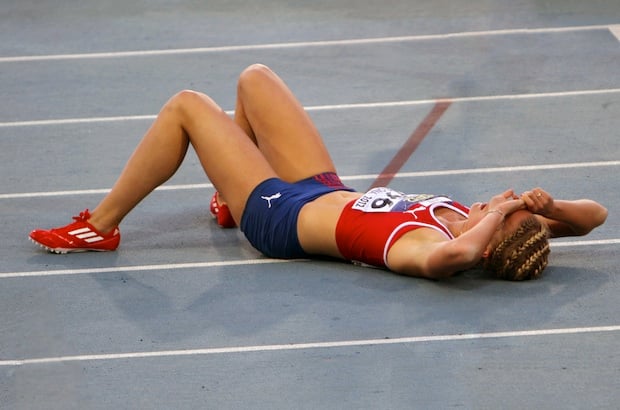Three weeks ago I ran my first half marathon. Which was also my first-ever race. And I had a terrible cold.
Ordinarily, I’m the kind of person who sequesters herself firmly on the couch at the first sign of a sniffle, but in this case, after three months of getting up in the cold and dark to train and countless weekends of tourist-dodging while jogging around the Mall, it wasn’t an option. I didn’t quite reach my goal of finishing in under two hours (my final time was a maddening 2:00:30) but the experience of running 13.1 miles through the city with all the cheerleaders and crowds was unforgettable.
My runner’s high only lasted for so long, though. A week later, after the cold had enacted its revenge for several days, I was struggling to run farther than a mile and began to worry that all the fitness I’d built up had evaporated. I was also feeling sluggish and unmotivated without a training schedule. In my post-race low, I turned to local running experts for answers.
Running coach Julie Sapper of Run Farther & Faster assured me that my symptoms were totally normal. “It’s really common, especially with longer races, because you put a lot of eggs in that basket and you adjust your lifestyle to meet a goal,” Sapper says. “Once you complete it, you’re so excited and in that euphoric state for a couple of days. But then it wears off, and especially this time of year when it’s still cold out it’s hard to get going again.”
Take It Easy
Post-race, runners—particularly if they’re Washingtonian type-A overachievers—have to face a new challenge: recovery. If you’re tackling a 5K or a 10K, getting over it isn’t necessarily such a big deal, but if you’ve run ten miles or more, it’s imperative to give your body time to heal for at least a week. “The normal guidelines for recovery are one day for every mile raced,” says Lisa Reichmann, also a running coach at Run Farther & Faster. “So if you’ve done a half marathon, it should be two weeks before you’re back to your normal running schedule. You can still run within that period, but it’s important to take it easy.”
Try a New Fitness Class
Unfortunately, taking a week off from running can also leave you feeling lazy—even depressed—from the lack of endorphins. “What people do is finish a race and then they don’t do anything for a couple of days, and they start to feel really flat,” says Mike Wardian, ultra-marathoner and three-time champion of the National Marathon. “The best thing to do is keep mobile. Try and get out and do 45 minutes or an hour of walking to keep everything moving and help flush out toxins. It doesn’t have to be intense.” Wardian says it’s a good time to try out that new fitness class you’ve been wanting to check out, such as a yoga or Pilates.
As for feeling like you’re losing fitness by taking a week off? Bunk, says Mike Hamberger of DC Running Coach. “A lot of people think they’re going to get out of shape if they take a recovery week, and that’s why a lot of my runners come to me injured,” Hamberger says. “Every four to eight weeks, everyone who works with me gets a recovery week. It doesn’t mean being a couch potato. It means everything gets cut in half. The old adage of ‘race hard, rest hard’ is very true.”
Set a New Goal
Another good way to stave off the post-race blues is giving yourself a new goal, and it doesn’t have to be a longer race or a full-on commitment such as a marathon. “The way I stay motivated is I usually have a lot of things lined up afterwards, so I’m training to quickly refocus on the next challenge,” says Wardian. Sapper and Reichmann advise their clients to focus on improving their pace during a shorter race. “If you run a half, your next race doesn’t have to be a marathon,” says Reichmann. “It could be a faster 10K, or another half. It’s like the build-up to any big event, like a wedding or a holiday—you can feel kind of lost afterward. It’s important to find something else to do.”
Make Some Changes
Whatever happened with your race, there are three steps Sapper advises taking after you finish. The first is to focus on your accomplishment. The second is to set a new goal. And the third is to take a step back and look at mistakes you might have made during your training. “Did you do enough cross-training? Did you build enough strength in your core?” Sapper says. “If not, focus on doing more of that next time. But don’t forget your accomplishment and how far you came in a relatively short time to achieve something that might have been unimaginable a few months earlier.”


















